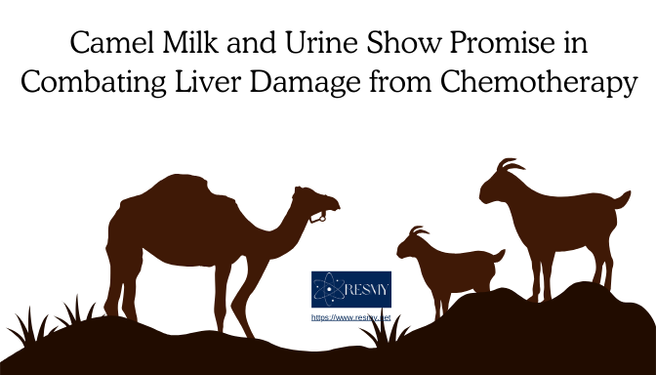Study Investigates MTX-Induced Liver Damage and Potential Protective Effects of Camel Milk and Urine
Methotrexate (MTX) is a widely used chemotherapeutic drug for various cancers and autoimmune diseases. However, a well-documented side effect of MTX is its potential to cause liver damage, especially with long-term use. This study aimed to investigate whether camel milk (CM) and camel urine (CU) could offer protection against MTX-induced hepatotoxicity (liver damage).
The researchers used rats to model the effects of MTX on the liver. Animals receiving MTX alone showed elevated levels of liver enzymes, indicating cellular stress and potential damage. Additionally, markers for DNA fragmentation and a protein associated with cell death (cytokeratin 18) were also increased in the MTX group, confirming liver injury.
CM and CU Reduce Liver Damage Markers and Improve Other Health Parameters
The study’s key finding is the positive impact of CM and CU on MTX-induced liver damage. Rats treated with both MTX and CM or CU displayed significantly reduced levels of liver enzymes, DNA fragmentation, and cytokeratin 18 compared to the MTX-only group. This suggests that CM and CU may offer a protective effect against MTX-related liver injury.
The benefits observed extended beyond the liver. The study found that CM and CU treatment led to a decrease in blood sugar levels (fasting blood glucose) compared to the MTX-only group. This suggests a potential anti-hyperglycemic effect of CM and CU, which could be beneficial for patients managing blood sugar alongside their MTX treatment.
The researchers also investigated the antioxidant properties of CM and CU. They observed an increase in total antioxidant capacity (TAC) in the rats treated with CM and CU. This is significant because antioxidants help combat oxidative stress, which can contribute to cell damage and various diseases.
Partial Improvement in Blood Clotting Parameters and Need for Further Research
While the study demonstrated promising results in reducing liver damage, blood sugar levels, and oxidative stress, it did not observe a complete reversal of all MTX-related side effects. Notably, blood clotting parameters remained altered in the CM and CU groups. This indicates that further research is needed to fully understand the impact of these treatments on MTX-related side effects.
Despite this limitation, the study provides valuable insights into the potential of camel milk and camel urine for mitigating the side effects of MTX therapy. The researchers suggest that the protective effects might be due to a combination of factors, including the presence of antioxidants, anti-inflammatory compounds, and the ability to bind and remove toxins.
Future Directions: Clinical Trials and Understanding the Mechanism of Action
The researchers concluded that “Our findings highlight the potential therapeutic benefits of camel milk and camel urine in counteracting methotrexate-induced hepatotoxicity.” They observed “cytoprotective, antiapoptotic, antioxidative, antihyperglycemic, and partial antithrombotic effects” of these natural products.
It’s important to remember that this is a preliminary study conducted in animals. Further research, including clinical trials in humans, is necessary to confirm the safety and efficacy of CM and CU in a clinical setting. Additionally, more investigation is needed to understand the optimal dosage and form for potential therapeutic use.
However, this study opens exciting possibilities in the field of complementary and alternative medicine for cancer patients undergoing MTX therapy. The potential for readily available and natural products like camel milk and camel urine to reduce the burden of chemotherapy side effects is a promising avenue for future research and development.
Reference: here

